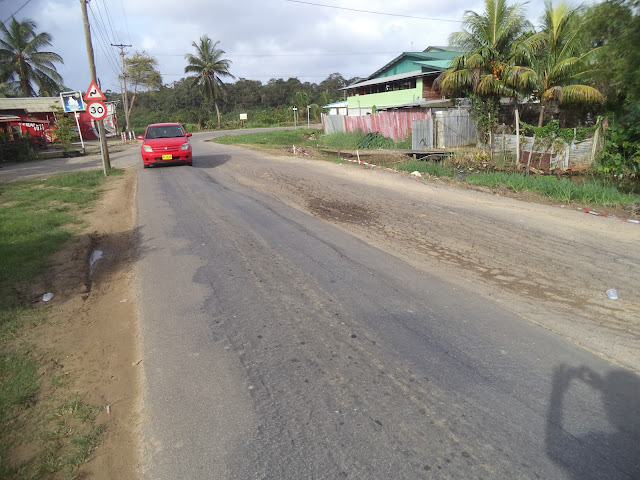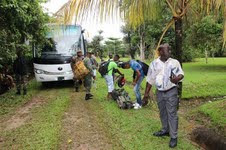The recent economic free fall of the Surinamese dollar and subsequent sharp rice in prices of basic commodities has added Suriname to the list of Latin American and Caribbean countries where a growing popular protest is demanding change of government. Current regional developments in South America do not bode well for Suriname's relations with its neighbors French Guyana , Guyana and Brazil.
First zone of attention is in the East. Goldmining along Suriname's Marowijne river area has attracted fortune seekers from all over South America, particularly from Brazil who have flocked together in what is now called Suriname's 'Wild West' in the East. In an attempt to curb illegal goldmining on the Marowijne river, French and Surinamese law enforcement authorities have recently confiscated and destroyed goldmining equipments and gold from so called Garimperos (armed Brazilian gold miners),the latter did not shy away from attacking French Guyanese officials in search for confiscated gold and using fire arms in their attack, before fleeing to the Surinamese side of the Marowijne border.
This breach of peaceful coexistence between Suriname and French Guyane is caused by foreign nationals who use Suriname as a hide out and disappear in a goldmining "Wild West" in the eastern border area, inhabited by more than 4000 goldminers who work for Surinamese nationals.
The second zone is on the Western border where Suriname is still dealing with an old border dispute over the so called contested "Tigri Area" where both Guyana and Suriname claim ownership over a substantial piece of territory along the Corantyne river.
Although several multilateral and bilateral talks have been held concerning this territorial dispute it still has not been officially settled, which leaves Suriname no other choice that to defend its territory if Guyana should occupy or confiscate Surinamese territory. In essence the colonial maps which the British and Dutch Kingdoms drew in the past left room for error and dispute. For decades the Suriname/Guyana border dispute has been left unresolved and is still a potential ticking time bomb. In view of Guyana's stance towards Venezuelan claims on Guyanese territory which led to international mediation to cool down the tensions between Venezuela and Guyana , Suriname had to take defensive precautionary measures on its Eastern border.
The third zone is our Southern border with Brazil. The recent undemocratic power grab in Brazil caused the popular Dilmah Roussef presidency to be replaced by USA sponsored, all white, male Temer government, which does not even have 1% support from Brazilian voters. The new corrupt Brazilian leadership has already made its conservative policy statement and Suriname has to be prepared for social and political unrest in Brazil. The nomadic peoples which are indigenous inhabitants of the southern border territory between Brazil and Suriname can be expected to become pawns in the major operations under USA direction aimed at confiscation and control of natural resources in South America, including Suriname's natural resources.
It is a matter of time before the pressure on Venezuelan and Brazilian 99% is reason for escalation of armed aggression against them and Suriname had better take precautions before it is too late, like they say in a Surinamese proverb. Dringi dresi,wakti Siki which translates as drink your medicine before you get ill.




























